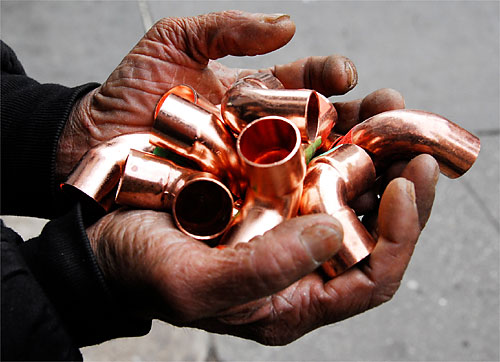Copper is the new gold for Brooklyn’s criminals.
At least four heists of the once-cheap electrical conductor have been pulled off in Brownstone Brooklyn since June, and a few others were foiled when the cops caught the bad guys red-handed before they could make off with their ill-gotten orange gold.
It’s no wonder copper is attracting thieves. Stolen pipes and wiring can be sold to scrap metal dealers for $3–$4 per pound — and compared to other valuables, it’s relatively easy to haul it away from unguarded construction sites and abandoned buildings.
“You can find it at any construction site,” said Jim, a plumber who was unloading copper pipes at the Oro Condo tower at 306 Gold St. in Downtown Brooklyn on Monday afternoon.
The plumber, who asked that his last name not be used, said workers at the Oro site now know better than to leave anything where thieves might be tempted to walk off with it.
“Nothing gets left out unguarded, not even a screw,” the hardhat said.
A few blocks from the Oro, Dennis Wise guarded a construction site at the corner of Flatbush Avenue and Willoughby Street, where a demolition crew tore down a parking garage.
He said he’s ready for anything.
“If someone tries to steal from this site, they have to go through me, and that’s not going to happen,” he said.
Wise said would-be thieves have offered him bribes to look the other way while they rip off the construction sites he’s guarding.
“These people come and offer me a few hundred bucks to risk my job so they can get some copper,” Wise said. “But I’m smarter than that. My job is worth more than a few hundred dollars.”
Law enforcement is getting into the act, with local precinct commanders assigning cops to prevent copper capers before they happen.
Police Officer Thomas Brown of the 90th Precinct in Williamsburg regular visits construction sites to remind workers to lock up their copper pipes and wire every night.
“When a thief passes by a construction site, he thinks, ‘Oh, they’ve got new pipes in there, I can just go in and rip them out and I’ll be set,’” Brown said. “But he can’t do that if the site is secure and guarded.”
But even a guarded site can become a target. Just ask the construction crew at the Ikea in Red Hook. Thieves raided the guarded, fenced-in site in June and stole a huge cache of welding cable. That was the first in a mini-crime wave, police records show.
A commercial building on Sterling Place was robbed of almost $3,000 in copper piping in July.
Another thief walked off with 37 spools of orange gold from the armory on Eighth Avenue at 14th Street in Park Slope in August.
And a couple of thieves made off with $1,500 worth of copper wire from a Flatbush Avenue construction site in Downtown Brooklyn last month.
Such thefts place Brooklyn in the center of a larger national trend, experts said.
Ken Geremia, a spokesman for the Copper Development Association, an industry group, says there was a “huge escalation in copper thievery” when its value hit a high of $4 a pound in May, 2006.
“Thievery has always been a problem,” Geremia said. “But with the market price being at a historic high, thefts are also at a historic high.”
The metal is highly sought after, not just because of its value, but also because it is readily available and perfect for risk-averse criminals (who wants to rob people in the street or break into a home?).
The increase in thefts has gotten the attention of the scrap metal industry, too.
Earlier this year, Frank Cozzi, the chairman of the Institute of Scrap Recycling Industries, reminded his members to be on the lookout for stolen scrap.
He suggested a good rule of thumb for scrap metal dealers: Think twice if someone shady shows up with “manhole covers, funeral plaques or 20-foot lengths of copper downspouts tied to the top of a 1970 VW Beetle.”























